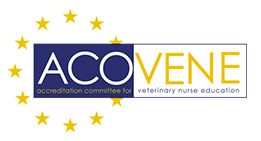- Have any questions?
- +44 020 7222 2001

ACOVENE Board Adopts Outcome-Based Competencies for Veterinary Nursing
3 Aprile 2024
Bridging Excellence: ACOVENE Vet Nursing Stream at this year’s FECAVA’s Euro Congress
11 Aprile 2024In November 2023, the Accreditation Committee for Veterinary Nurse Education (ACOVENE) approved the fourth edition of its Accreditation policies and procedures, demonstrating its commitment to ensuring the highest quality educational experiences and assessing student knowledge and skills.
ACOVENE's accreditation process involves key stakeholders, including veterinary practitioners, practicing veterinary nurses, and educators, playing a pivotal role in maintaining educational standards. Accredited programs must adhere to robust standards covering eleven critical areas, from institutional accreditation to curriculum and assessment strategies.
Scheduled for implementation in 2024, the fourth edition introduces several significant updates aimed at enhancing the quality and relevance of veterinary nurse education. These updates prioritize the health and wellbeing of both people and animals, foster a culture of empowerment and safety, and strengthen stakeholder involvement throughout the educational process.
Key amendments include integrating evidence-based nursing practices and professional behaviours into the standards, ensuring education aligns closely with the evolving needs of the profession. Additionally, the new standards emphasize inclusivity by providing support and adjustments to best practices.
Furthermore, the updated accreditation policies place a greater emphasis on evidence-based evaluation and improvement strategies, ensuring programs continually evolve to meet the changing demands of veterinary nursing practice.
Schools undergoing accreditation will receive support in implementing these new standards, ensuring a smooth transition and alignment with best practices. These revisions underscore ACOVENE's ongoing commitment to excellence in veterinary nurse education, reinforcing the profession's vital role in safeguarding the health and welfare of both animals and society at large.
In summary, ACOVENE's approval of the fourth edition of Accreditation policies signifies a significant step in enhancing veterinary nurse education, prioritizing health, evidence-based practices, and inclusivity. By supporting schools and evolving with practice demands, ACOVENE ensures high standards, safeguarding animal and societal welfare.




